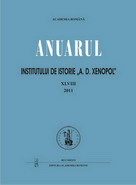ASTRA, FUNDAŢIILE CULTURALE REGALE ŞI CONSTITUIREA CONSILIULUI NAŢIONAL AL LICHIDĂRII NEŞTIINŢEI DE CARTE (IUNIE 1946). IMPLICAŢII POLITICE
ASTRA, ROYAL CULTURAL FOUNDATIONS AND THE CONSTITUTION OF NATIONAL COUNCIL FOR ILLITERACY ERADICATION (JUNE 1946). POLITICAL IMPLICATIONS
Author(s): Mihaela TEODORSubject(s): History
Published by: Editura Academiei Române
Keywords: illiteracy; cultural centres; propaganda; political confrontation; National Council
Summary/Abstract: Illiteracy was – and I believe it tends to become again – a real problem of Romanian society. Propaganda potential of this problem was understood, immediately after 23 August 1944, by both communists and social democrats. Those two political parties have claimed a monopoly on full eradication of illiteracy in Romania, regarded as a “vestige of bourgeois-landlord political regime”. Thus the fight against illiteracy has become one of the main themes of both parties political propaganda. Although, in theory, communists and social democrats worked together in the Workers Front, this issue became a topic of dispute between them. Because they had no rural propaganda tools they understood the importance of existing cultural centres, therefore they tried to involve the Royal Cultural Foundations and ASTRA in a so-called “collaboration”. This action was achieved through two ministries: Ministry of Education controlled by Social Democratic Party (SDP) and Ministry of Propaganda controlled by Romanian Communist Party (RCP). Gradually, the “fight against illiteracy” has become the monopoly of Communist Party. Both the interwar period contribution of ASTRA Association and Royal Foundations and the existence of National Council for illiteracy eradication, organized in June 1946, have been denied.
Journal: Anuarul Institutului de Istorie »A.D. Xenopol« - Iaşi
- Issue Year: XLIX/2012
- Issue No: 49
- Page Range: 161-167
- Page Count: 6
- Language: Romanian

